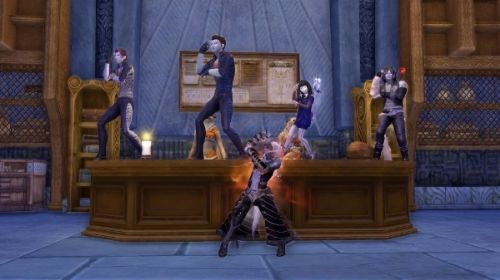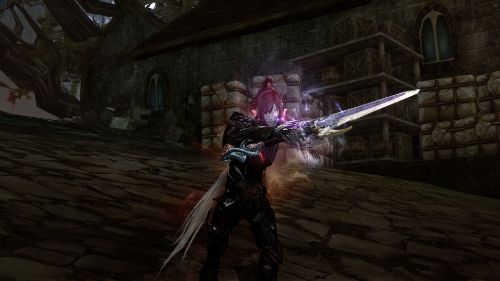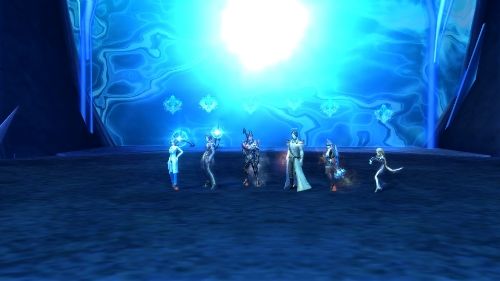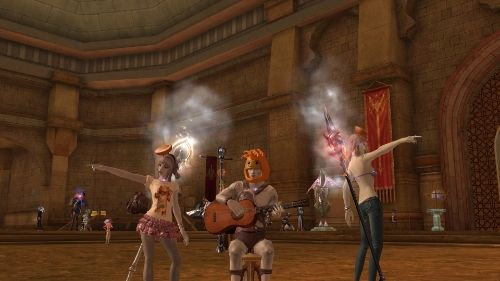One of the things that the Shadow Hearts series executes well is its parallels between the characters, specifically Yuri and Alice. These parallels serve as a staging point for character development. You, as the player, are given this stark contrast between the rough around the edges Yuri and the more prim, proper and innocent Alice. Using characters with fundamentally different personalities allows Shadow Hearts to develop in a more dynamic way and provides a deeper perspective on how each character evolves along with the story.
Alice and Yuri are a strange pair to be sure; at the beginning of Shadow Hearts they hardly know what to think of each other. This feeling of ambiguity lasts for a bit and you're able to watch as the characters slowly grow closer together, forging a bond is kept alive through the series.
--SPOILER ALERT--
This dynamic relationship between Yuri and Alice is explored more in the second game after Alice's canonical death at the end of the first game. It's one of the only series that I can think of that actually has the "bad" ending classified as the "real" ending. This theme is carried over to the end of Shadow Hearts: Covenant as Yuri succumbs to a curse at the end in a fairly similar manner to Alice's demise at the end of the first game.
Due to Alice's prior passing she is not physically present within Covenant but she still plays a large role when dealing with Yuri's now cursed soul. The "good" ending of the game depicts Alice pulling Yuri's entrapped soul out of the mistletoe's curse before his wish to return to the day he and Alice met was granted, releasing him from the curse.
The obvious parallel between Darkness (Yuri) and Light (Alice) can be seen throughout the story as well as an emphasis redemption through action. Few games can bring such a strange, diverse, and yet still lovable characters through such tragic circumstances. This series is not one that embraces a happy tone, often favoring a more somber mood and very few periods of rest or happiness. The emphasis is on the sacrifice that the characters make throughout the game, often for each other.
This theme is carried through to the second game where we are introduced to an extremely powerful, yet determinedly more aloof Yuri that is holed up in a church, protecting a small town from invading soldiers. The loss of Alice can be felt throughout the game and Yuri is in a near constant state of grief when you look at the circumstances he lives with. The previously flirtatious Yuri adopts a much more reserved state of being, he becomes more serious and uses the remainder of his life to save whatever he can before finally returning to Alice.
The Yuri we see in Covenant and the Yuri from the original Shadow Hearts are so vastly different that it breaks my heart. Few games have shown me character development on this level, and the depiction of Yuri's suffering is often hidden, he doesn't always wear his emotions on his sleeve. This aspect of his character made him feel very...real, as he acted the way most people would after losing the one they loved, he was withdrawn.
Actual depictions of suffering are typically quite limited within video games and very few characters actually develop enough to evoke emotional reactions from the people playing them. I tip my hat to the individuals responsible for developing not only Yuri and Alice but the entire Shadow Hearts cast. To this day it remains one of the more potent RPG's that I've had the pleasure of playing through. I'll just keep pretending the third installment of the series didn't exist.
Alice and Yuri are a strange pair to be sure; at the beginning of Shadow Hearts they hardly know what to think of each other. This feeling of ambiguity lasts for a bit and you're able to watch as the characters slowly grow closer together, forging a bond is kept alive through the series.
--SPOILER ALERT--
This dynamic relationship between Yuri and Alice is explored more in the second game after Alice's canonical death at the end of the first game. It's one of the only series that I can think of that actually has the "bad" ending classified as the "real" ending. This theme is carried over to the end of Shadow Hearts: Covenant as Yuri succumbs to a curse at the end in a fairly similar manner to Alice's demise at the end of the first game.
Due to Alice's prior passing she is not physically present within Covenant but she still plays a large role when dealing with Yuri's now cursed soul. The "good" ending of the game depicts Alice pulling Yuri's entrapped soul out of the mistletoe's curse before his wish to return to the day he and Alice met was granted, releasing him from the curse.
The obvious parallel between Darkness (Yuri) and Light (Alice) can be seen throughout the story as well as an emphasis redemption through action. Few games can bring such a strange, diverse, and yet still lovable characters through such tragic circumstances. This series is not one that embraces a happy tone, often favoring a more somber mood and very few periods of rest or happiness. The emphasis is on the sacrifice that the characters make throughout the game, often for each other.
This theme is carried through to the second game where we are introduced to an extremely powerful, yet determinedly more aloof Yuri that is holed up in a church, protecting a small town from invading soldiers. The loss of Alice can be felt throughout the game and Yuri is in a near constant state of grief when you look at the circumstances he lives with. The previously flirtatious Yuri adopts a much more reserved state of being, he becomes more serious and uses the remainder of his life to save whatever he can before finally returning to Alice.
The Yuri we see in Covenant and the Yuri from the original Shadow Hearts are so vastly different that it breaks my heart. Few games have shown me character development on this level, and the depiction of Yuri's suffering is often hidden, he doesn't always wear his emotions on his sleeve. This aspect of his character made him feel very...real, as he acted the way most people would after losing the one they loved, he was withdrawn.
Actual depictions of suffering are typically quite limited within video games and very few characters actually develop enough to evoke emotional reactions from the people playing them. I tip my hat to the individuals responsible for developing not only Yuri and Alice but the entire Shadow Hearts cast. To this day it remains one of the more potent RPG's that I've had the pleasure of playing through. I'll just keep pretending the third installment of the series didn't exist.













